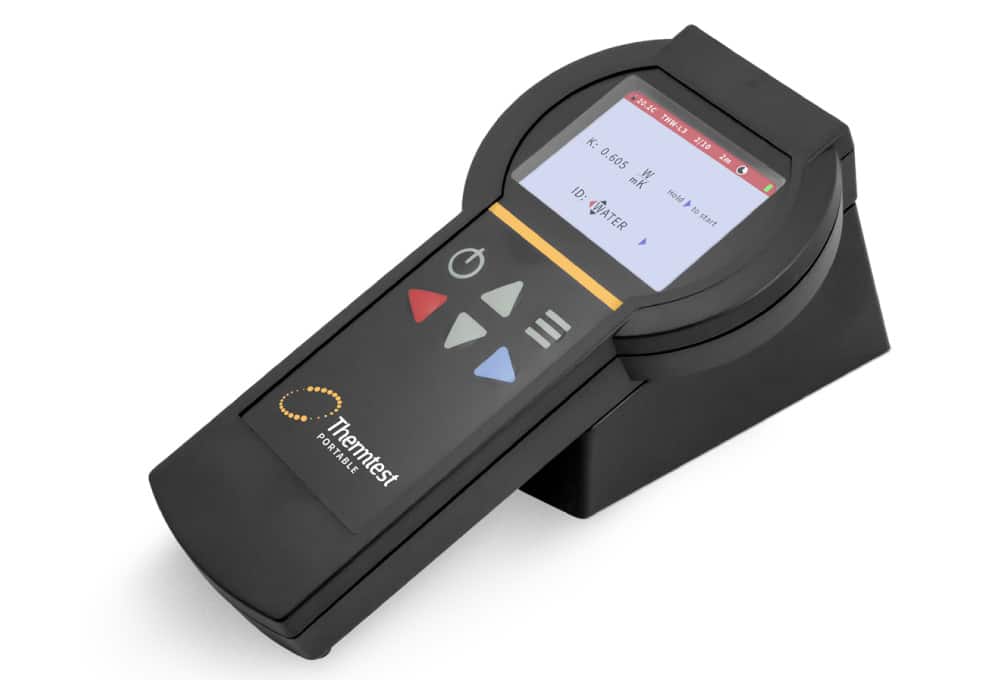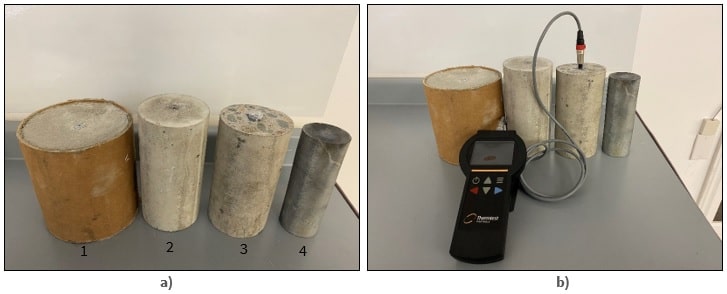The Measurement Platform-2 (MP-2) is an advanced meter with unique selection of transient thermal conductivity sensors for a variety of applications, with a focus on primary measurements. The transient thermal conductivity sensors share similar principles of operation. The sensor wire is heated using a constant current source (q) and the temperature rise is recorded by monitoring the change in electrical resistance of the wire (THW and EFF) or by resistance temperature detector device (TLS). For samples of high thermal conductivity, resistance increases more slowly over time; for samples of low thermal conductivity, resistance increases more quickly over time.

Picture 1. Thermtest MP-2 Thermal Conductivity Meter
Thermal conductivity MP-2 users benefit from the convenience and accuracy gained when using primary testing methods. The MP-2 controller auto-detects the connected sensor and loads corresponding testing parameters. Measurements are easily performed with the smart on-board software and transferred to computer with an included Windows utility program.

Picture 2. Thermtest TLS 50mm sensor for use with the MP-2 portable meter.
The TLS 50mm sensor is one of the many sensors offered with the Thermtest Portable Measurement Platform (MP-2), with a temperature range of -40°C to 100°C. This sensor offers simple yet accurate measurements of concrete, rock, and polymers from 0.3 to 5 W/m·K via the transient line source method. The TLS 50mm adheres with an internationally recognized standard of testing by complying with ASTM D5334-22. The TLS 50mm has a 5% accuracy and a 2% reproducibility of measurement, making it a highly accurate and precise instrument for measuring the thermal conductivity of concrete, rock, and polymers.
Concrete is a type of building material that is made from a mixture of cement and an aggregate, which is typically rock or gravel. Cement is a binding agent and is rarely used on its own. Different mixtures of concrete will affect the strength and density of the material, so the particular mixture used would be dependent on the application. The thermal conductivity of concrete will also change depending on factors such as its aggregate mixture. This is an important property, particularly in terms of buildings and energy efficiency. This application sheet uses the Thermtest TLS 50mm sensor to measure the thermal conductivity of four different samples of concrete.
For this experiment, a hole was drilled into each concrete sample. The TLS 50mm was then covered with enough thermal paste to ensure proper contact between the sensor and the sample. The thermal conductivity of the sample can then be tested with a high degree of accuracy.

Figure 1: a) Four samples of concrete, each made from different mixtures of aggregate and cement b) TLS 50mm sensor inserted into concrete sample.
Table 1: Results of measuring four concrete samples at room temperature with the TLS 50mm.
| Concrete Sample # | Average Thermal Conductivity (W/m·K) | Standard Deviation (W/m·K) |
|---|---|---|
| 1 | 1.231 | 0.008 |
| 2 | 1.813 | 0.013 |
| 3 | 1.564 | 0.011 |
| 4 | 2.593 | 0.047 |
The TLS 50 mm has a 5% accuracy and a 2% reproducibility of measurement, making it a highly accurate and precise instrument for measuring the thermal conductivity of concrete, rock, and polymers.